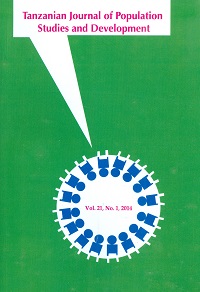Challenges of Local Community Participation In Decision-Making Over Land for Biofuels
Abstract
This article examines how decision to give land to foreign investors for biofuels in four districts of Kisarawe, Bagamoyo, Rufiji, and Kilwa were made. It aims at assessing the extent to which villagers were involved in decision-making. Drawing from literature on decentralization and community participation in decision-making, the article identifies challenges facing community participation in decision-making over land for foreign direct investment in biofuels. Secondly, the article examines participation and accountability of different stakeholders in decision-making. Lastly, it assesses the effectiveness of decentralization of land management in Tanzania in bringing development to local communities. It draws evidence from interviews with villagers, government officials, investors in biofuels, and minutes of village meetings to discuss land acquisition by the investors. The article argues that while many studies on community participation have identified challenges in ensuring community participation in development, there are specific challenges associated with foreign direct investment and land resources. It shows that certain types of development projects such as foreign direct investment, and certain types of resources such as land, demand accountability and governance at different levels of decision-making and not just by the local communities. In this case accountability of the state and the foreign investors is equally important as that of the local community.
References
Agwaral, A., & K. Gupta. 2005. Decentralization and Participation: the Governance Of The Common Pool Resources in Nepals Terrain. World Development, 33(7): 1101-1114.
Bruns, B. 2003. Developing an Extended Ladder of Participation: Politics of the Commons Articulating Development and Strengthening Local Practices. RCSD Conference, July 11-14 Chaing Mai Thailand.
Chambers, R., 1997. Whose Reality Counts? Putting the Last First. London: Intermediate Technology Publications.
Cornwell, A., & A. Brock 2005. What do Buzzwords Do for Development Policy? A Critical Look at Participation. Third World Quarterly, 26(7): 1043-1060.
Gibbon, P. (ed.). 1993. Social Change and Economic Reform in Africa. Uppsala: The Institute of African Development.
Hart, G. 2002. Disabling Globalization: Places of Power in Post Apartheid South Africa. Berkeley and Los Angeles: University of California Press.
Heller, P. 2001. Moving the State: The Politics of Democratic Decentralization in Kerala, South Africa and Porto Allegre. Politics and Society, 29(1): 131-163.
Kelsall, T. 2000. Governance, Local Politics and Districtization in Tanzania: The 1998 Arumeru Tax Revolt. African Affairs, 99: 553-551.
Killian, B. 2009. Empowering the Poor through Participatory Approach: The Case of Finnish Aid in Southern Tanzania. Tanzanian Journal of Population Studies and Development, 16(2): 60-80.
LEAT, 2011. Land Acquisition for Agribusiness in Tanzania. Rosa Luxemburg Foundation.
Mgumia, J., B. Ally, E. Mvula, 2007. Ripoti ya Awali ya Usimamizi wa Ardhi Vijijini: Wilaya za Rufiji na Kilombero. Haki Ardhi.
Palloti, A. 2008. Tanzania Decentralizing Power and Spreading Poverty? Review of African Political Economy, 116: 221-235.
Ribot, J.C. 2001. Integral local development: accommodating multiple interests through entrustment and accountability representation. International Journal of Agriculture Resources, Governance and Ecology, 1(34).
€”. 2004. Waiting for Democracy: The Politics of Choice in Natural Resources Decentralization. WRI, Washington DC, USA.
URT. 2005. MKUKUTA I. Dar es Salaam: Ministry of Finance and Economic Affairs.
€”. 2010. MKUKUTA II. Dar es Salaam: Ministry of Finance and Economic Affairs.
€”. 2010. Guidelines for Sustainable Liquid Biofuels Development in Tanzania. Ministry of Energy.
€”. 1999. Land Acts No. 4 and 5.
€”. 1982. Local Government (District Authorities) Act.
WWF. 2008. Biofuels Industry Study Tanzania, an Assessment of the Current Situation, WWF Tanzania Programme Office, and WWF Sweden.


